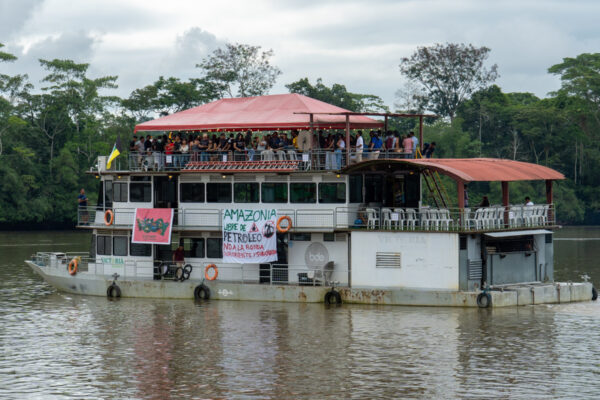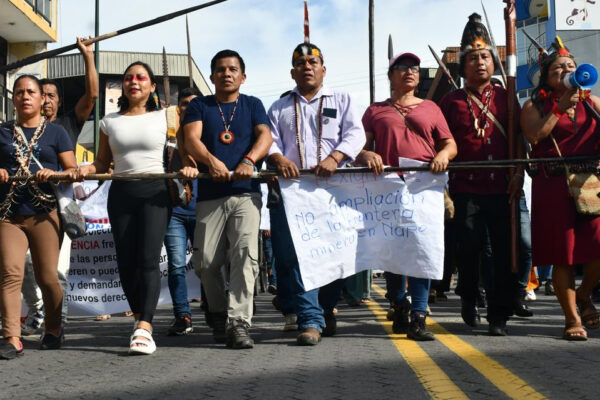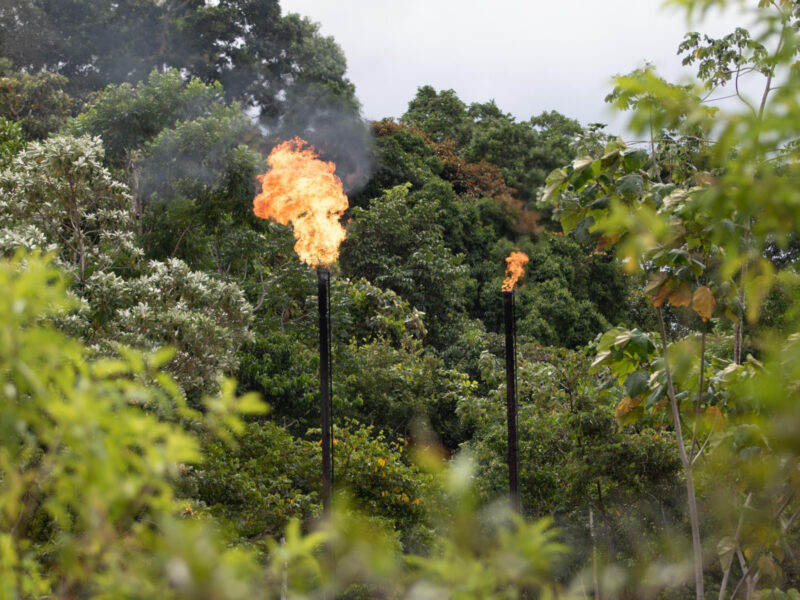San Francisco, CA – International environmental advocacy groups Stand.earth and Amazon Watch are optimistic about European bank Intesa’s new commitment to exclude oil from the Amazon Headwaters region of Ecuador and Peru.
Intesa’s announcement comes just one month after the release of Stand.earth and Amazon Watch’s Banking on Amazon Destruction report failing global banks for their financing and investment in the oil and gas industry in the Amazon rainforest. The report revealed that despite sustainability commitments, banks’ exclusions and screens – designed to manage the risks of climate change, biodiversity loss, deforestation, indigneous rights’ infringements, pollution, and corruption – fall short of protecting the Amazon from oil and gas extraction. Banks remain highly exposed to the risk of funding Amazon destruction – and ultimately, climate chaos – due to their ongoing relationships with companies and traders operating in the region.
In its new commitment, Intesa expands its definition of unconventional oil and gas to include the extraction and production in geographical areas that are characterized by “fragile ecosystems that represent an important heritage in terms of biodiversity, have a decisive role in regulating the planet’s climate and that can be irremediably damaged in emergency situations such as, for example, in the event of an oil spill” – including oil in the area known as the Amazon Sacred Headwaters.
In response to the announcement, Stand.earth and Amazon Watch issued the following statement:
“Intesa’s new commitment to exclude oil from the Amazon Headwaters region shows how banks can expand Amazon-specific exclusion policies beyond just trade financing. While the policy falls short of the call for banks to extend Amazon oil exclusions to the entire Amazon Biome, it illustrates how geographic exclusions are a necessary part of banks’ climate commitments, in order to safeguard globally important ecosystems from oil expansion and to foster the just transition called for by Indigenous leaders in the Amazon,” said Angeline Robertson, Senior Investigative Researcher at Stand.earth Research Group. “We are calling on other global banks financing or investing in Amazon oil, including Goldman Sachs and Citigroup, to implement or expand their Amazon commitments and align their exit strategies with the urgency of the climate crisis.”
About Intesa’s commitment
Intesa’s exclusion for the Amazon Headwaters region is more extensive than other banks’ recent Amazon commitments, including recent trade finance exclusions from fellow European banks BNP Paribas, Credit Suisse, and ING. It covers all financial products and services, as well as advisory services, and applies to projects and companies involved in exploration, production, and pipeline transport of Amazon oil.
However, while project finance is explicitly covered, the policy is more vague on trade and corporate finance. The exclusion also does not grandfather in existing financing, and only includes new projects and activities. While it aims to reduce all exposure to zero by 2030, other banks have taken action quicker to reduce current exposure on trade financing.
“Whether or not Intesa’s commitment will result in meaningful impact depends on its current exposure. If Intesa currently provides financing for oil and gas in the Amazon Headwaters region, then a 2030 deadline is too far in the future to be meaningful. In addition, the policy covers the Amazon rainforest in Ecuador and Peru, but does not include the same extraction occurring in Colombia. The policy also does not include gas exploration and extraction, which threatens intact forests in the Brazilian Amazon. To have an impact, Intesa must increase the geographic scope of its policy, labelling all oil and gas from the Amazon biome as ‘unconventional’ and excluding it from any finance and investment portfolios,” added Robertson.
Amazon at a tipping point
The Amazon rainforest is nearing a tipping point thanks to the massive degradation of this interconnected ecosystem. Scientists define the tipping point as the moment at which enough deforestation occurs that the Amazon will no longer be able to sustain itself, which will trigger the dieback of the entire rainforest. Due to the looming nature of these threats, which would have massive implications in the region and for the global climate, advocacy groups Stand.earth and Amazon Watch are calling for:
- An immediate commitment (latest by end of 2021) to no new oil and gas financing and investment in the Amazon biome.
- The extension of existing Amazon oil trade finance exclusions to the entire Amazon biome by the end of 2021.
- A commitment to exit all loans, letters of credit, and revolving credit facilities for all oil traders (especially those implicated in corruption controversies) active in the Amazon biome as soon as possible, or at the latest by the end of 2024.
- A commitment to ending all existing oil and gas financing and investment in the Amazon biome as soon as possible, or at the latest by the end of 2025.













